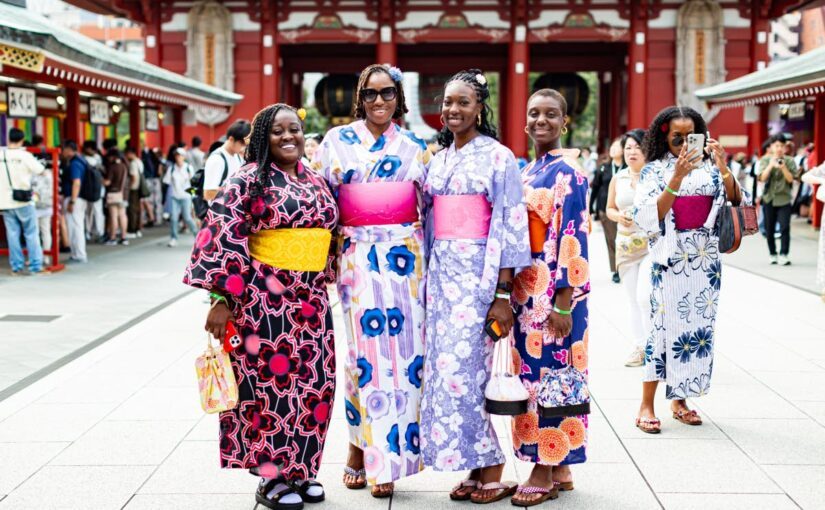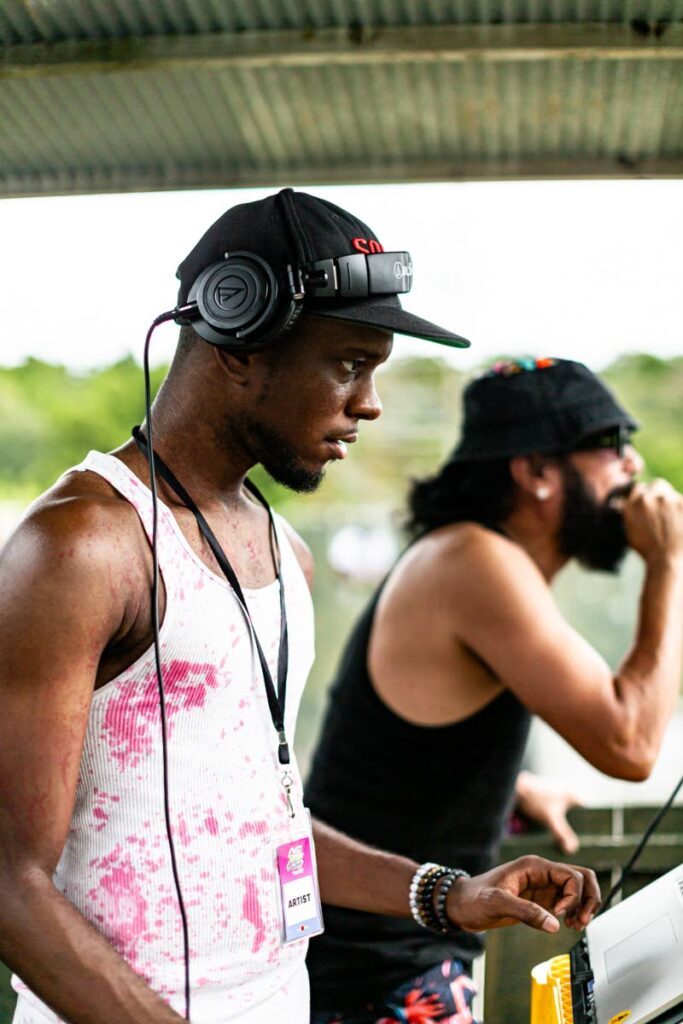Soca in Japan organisers encourage islanders to travel
Written by Rhianna Mc Kenzie on October 9, 2024

RHIANNA MCKENZIE
After months of anticipation, since opening registration in November 2023, participants from across the Caribbean landed in Tokyo Prefecture on September 17 for the annual Soca In Japan (SIJ) week of festivities.
The long, connecting flights did little to dampen spirits as the visitors were picked up at the airport and transported to Hotel East 21 in Koto City, where costume distribution was already in progress. After collecting costumes, participants were shuttled to another location for a welcome party.
On the bus, I made a game of trying to distinguish where everyone was from, based on their accents. While many came with their group of friends or family, they quickly introduced themselves and began talking, as islanders always do, like they had all grown up together.
Upfront the bus, I heard a Bajan man talking to a Jamaican, while a Trinidadian leaned over me to speak with an American young woman with Jamaican roots, whom she had made friends with on the plane. After spending the past two years away from home, I was thrilled to be in the company of so many West Indians.
At the welcome party, Japanese DJs played soca as the host venue served both traditional Japanese and Western appetisers, setting the tone for the next six days of cross-cultural events.

Caribbean tourists, expats living in Japan and Japanese nationals all gathered in Saitama prefecture for Japan Caribbean Carnival in September, the last event for Soca in Japan’s week-long events. The package included tours of Tokyo, cultural events and Caribbean-themed parties. –
Trinidad and Tobago-born Kegon Toussaint, SIJ organiser, spoke with Newsday after the visitors had returned to their respective countries at the end of September. He said this year had a fair amount of returning customers, adding that the initiative continues to grow, and there were more participants from the Caribbean.
“I met people from home, the US, Bim (Barbados), Jamaica and Canada…Last year, we assisted with the Japanese visa for one Trinidadian. This year, it was about six or seven. There were also attendees from Barbados and the US Virgin Islands who don’t require a visa to visit Japan for tourism.”
He said while residents of major economies like the US, Canada, and the UK often travel worldwide, he was thrilled to see people from the Caribbean using SIJ as an excuse to leave the comfort of the islands to see other parts of the world.
“I believe we are opening doors for them that they might not have imagined.”
Spreading culture
The SIJ concierge package includes tours of Tokyo and surrounding areas, Japanese cultural experiences like kimono-wearing and sumo wrestling during the day, and Caribbean-themed parties at night.
In November 2023, participants were allowed to RSVP their spot for the 2024 tour for US$350 with installment and various package options available.
On September 23, participants enjoyed Japan Caribbean Carnival (JCC) – the newest addition to the SIJ events lineup – a Caribbean-styled parade, now in its second year. The main seven-day, six-night package also included a costume, bilingual staff and ground transportation. Japanese residents and Caribbean expats in Japan also had package options allowing them entry to the events without having to do the tours.
Patrons were entertained by Japanese and Caribbean artistes and DJs, headlined by Vincentian soca star Johnny Fontainne aka Problem Child.
TT producer Keshav Chandradath Singh and TT-born, New York-based Jelani (DJ Jel) Roberts were also in attendance.
Last year, SIJ hosted soca artistes Nailah Blackman, Mical Teja and Jadel.
Toussaint got feedback from Fontainne, Singh and Roberts, who told him they were excited to be a part of spreading Caribbean culture to this corner of the world.
“Japan is a whole new culture to explore. Soca music is now global, and artistes and entertainers should be travelling with the music. Although Japan has a small community of soca lovers, Caribbean people and soca fans from around the world truly enjoy visiting. There’s even more passion when they experience a unique twist on their culture here.”

The SIJ concierge package includes tours of Tokyo and surrounding areas, Japanese cultural experiences like kimono-wearing and Sumo wrestling during the day and Caribbean-themed parties at night. –
He said there has always been a growing community of Japanese people who admire Caribbean culture and want to, or have already visited the islands. Interest in Caribbean music began with the introduction of Bob Marley and the Wailers when the Jamaican band toured Japan in 1979. Toussaint said the team has thought about introducing a similar cross-cultural experience to Trinidad Carnival.
“We’ve attempted something similar (in) Trinidad, but our team wants to have fun too. Organising these events involves a lot of work, so honestly, when we reach Trinidad, we just want to relax and explore. We’ll leave it to someone else to set up shop in Trinidad,” he said with a laugh.
Growth potential
Although Toussaint believes the tour has growth potential, the team has had to navigate a few challenges getting off the ground.
“This year was probably one of the most difficult we’ve ever faced,” he said, in frustration.
“In fact, we were on the verge of cancelling everything. We had issues securing venues, which resulted in a very late launch for ticket sales. We also had trouble securing hotel rooms, forcing us to change the festival date from the Silver Week holiday to the following week.”
Silver Week is a string of consecutive holidays in Japan in September, including Respect for the Aged Day and Autumnal Equinox Day.
“Although we didn’t publicly announce the new dates, some customers anticipated the usual Silver Week (timeline) and purchased their plane tickets, leading to disappointment when they saw the change. Additionally, we faced production issues with one of the costume sections. By the time we launched, airfare prices had skyrocketed, making it hard to afford to bring in our artists and DJs…
“In Yokohama, there was a thunderstorm, which impacted our setup at the preparation site…It was a nightmare. Fortunately, we kept pushing forward, and this year’s festival was well received by our customers.”

DJ Jel plays at Soca in Japan J’Ouvert. –
Toussaint said despite the hiccups, production this year was still an improvement from last year.
“The sightseeing tour was better balanced, allowing time for rest. Feedback from last year indicated it was too busy, and people were exhausted. Distribution was smooth, with customers in and out within ten-15 minutes. There were some (equipment) issues on the boat, which didn’t go as planned, but overall, the events were executed well.
“People love our product. We have something special and unique that can’t be found anywhere else in the world. However, the very uniqueness of our product is hindering our growth, (next year), we plan to open up the gates and let everyone in. We want SIJ to be sustainable and provide meaningful jobs to the community in Japan. Right now, it’s stuck in this annual event phase with gig jobs. I’d like some of those jobs to be more permanent and year-round.”
While many patronise SIJ every year, some were experiencing the events for the first time. Jadzia Miller, an American living in Japan for the past year, said she had been struggling to adjust to life in the country and decided to look for Caribbean events to attend to make her feel more at home. Miller was born to Jamaican parents.
“This is my first big event since I’ve been here,” she said after collecting her costume. She had heard about the event on social media and decided to give it a try.
“Japan’s culture is different. The people are friendly (but) it’s been hard…It takes a while to adjust.”
Miller said she was participating on her own and expressed her excitement to attend the events. She said she had some Carnival experience to compare SIJ to, having participated in Labour Day parades in New York City, where she is from, and mas in Antigua.
Stephen Durity, another solo traveller, also said he had heard about SIJ online and decided to give it a try. Originally from San Fernando, Durity now resides in Washington DC.
“I came early, since Saturday. I wanted to do some stuff on my own but I also wanted to support the guys putting this on.”
He said he has participated in mas over the years at home and in New York, however, as Japan had been on his bucket list for some time, he wanted to try the experience somewhere new.
“Japan was always a place I wanted to visit and so with this, it gave me an added boost to (come here). The whole concept is very intriguing, to open up a cultural exchange with an Asian country.”
Friends Hugh Lewis, Rod Ramsey and a woman who wished to be called Camille, came together to celebrate Camille’s birthday. Lewis, TT-born and based in Massachusetts, US, said he received a phone call from his schoolmate (Ramsey) who informed him of their plan to go to Japan.
“We normally hang out and do cultural things together (and) I liked the idea of our culture being promoted at a level where it is not stifled (or thought of) as just a Trini thing. I always said I wished we had branded (our culture). In other Caribbean countries, like Jamaica, you see (their culture) branded. Everyone says Trini Carnival is the best, but it’s just hearsay. It is not documented, so when I see things like this, it makes me feel like, at some point, it will be, and generations to come will know that this is our thing.”
Lewis said he has great pride in his country but believed Trinidadians do not value their culture as much as they should.
“Our value is pushed under the table. If we can take the culture we have created so far in the East, if we take pride in that and our (leaders) can place some value in it, then we can have, not just SIJ, but soca in the world.”
Camille, excited to have been gifted the trip for her birthday, said Japanese people are usually more involved in TT culture than Trinidadians are in theirs.
“They play the steelpan. (I saw it) on YouTube. It’s really great. I’ve seen the Japanese ambassador on the news and he was excited talking about TT culture.”
Ramsey, originally from Santa Cruz but who now lives in New Jersey, US, joked about how he made it to Japan.
“Honestly, my wife said that we’re going to Japan and I was sceptical. Then she said her sister was going and they already paid for the ticket. I said it was too expensive and she said I am too cheap and I said, ‘you know what? I will go.’”
Ramsey added that being in Japan had changed his perspective.
“I love it. Any opportunity to travel is important. When you add soca to it, that’s all you need.”
He said the opportunity to meet people from across the Caribbean and diaspora, and meeting people who had participated in SIJ in previous years, made him very excited about its prospects for the future.
“It’s small and it’s growing. It has the potential to get bigger.”
Japanese resident Mayu Sasaki said she has been involved in SIJ from the very beginning in 2018. Born in Hiyogo Prefecture (near Osaka) and currently living in Tokyo, Sasaki said she was pleased to see how much it has grown over the years.
“I know everyone involved in the events. It’s also very cool for Caribbean participants coming in from all over the world to Japan. They can learn about Japanese culture also.”
Sasaki first visited TT for Carnival in 2013 and has since been to other islands for the experience. Caribbean culture has also inspired her to create a T-shirt brand, called Fetable.
“It means ‘Fete Able’ because when you wear our outfit you can go to a fete,” she said happily.
Toussaint expressed his gratitude for the continued support from his team and loyal customers.
“This has been a challenging journey for my team and me. Our love for the culture, the music and our community drives us more than anything, as (production) involves a lot of work.”
He said his team worked tirelessly to execute all of the events, particularly JCC, to the joy and satisfaction of attendees.
“The masqueraders absolutely loved it,” he said, proudly. “Last year was our first carnival, so it was very experimental. This year, we added some Japanese twists that blended so well. It was truly amazing…Thank you again for making history with us, and we hope to see you all next year.”
The post Soca in Japan organisers encourage islanders to travel appeared first on Trinidad and Tobago Newsday.




